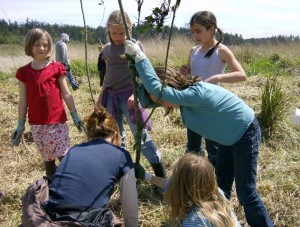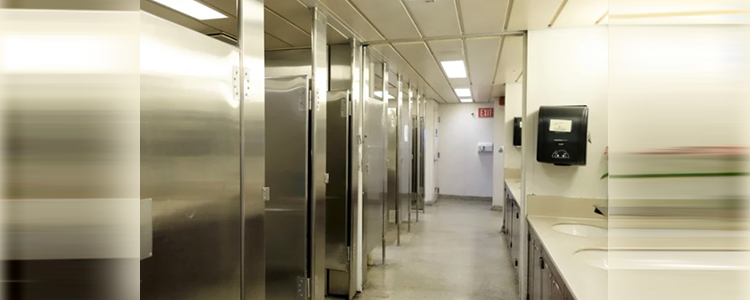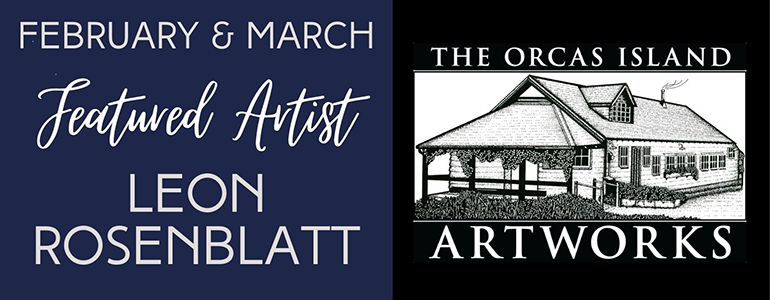
Salmonberry School students take part in tree planting and wetlands restoration this week. They will be working at the Indian Island Marine Health Observatory on the Eastsound waterfront Friday morning, May 14.
Updated May 14 at 11 p.m.
Daylong symposium at Orcas Senior Center and Salmonberry School this Saturday, May 15
“Parents, educators, and all others who are interested in taking a thoughtful and broad perspective on education from early childhood through adult education are all most welcome to attend a workshop concerning education’s alternative branches this Saturday on Orcas Island,” says Salmonberry School Program Director Paul Freedman.
The workshop, titled “Orcas Holistic Education Convergence” (OHEC), is hosted by Salmonberry School and will focus on “the current global consciousness shift and its implications within the field of education,” says Freedman.
“Alongside widely recognized movements such as holistic health care, organic agriculture, green building, localism, and green business, education is both responding to and in many cases leading a significant paradigm shift,” he says.
Freedman, a founder of Salmonberry School, is the father of two school-aged children. He has taught for 17 years, eight years in public school before coming to Salmonberry, and believes in the “democratic ideas of public education,” he says. At the same time he faces the challenge of “positioning oneself as an alternative educator… the perception that a different choice equates into some sense of an elitist attitude” or of hurting the public school.
“I would just ask for a sense of tolerance and good will for others who are trying to do what’s best for their kids…. at some point, another setting might meet their needs very well.”
Salmonberry School was founded in 2001, by “a small intimate group of parent-friends who wanted something special for our children…We didn’t do a lot of research; we had no board experience; we were not students of alternative learning experiences. We were doing it for the love of the children.”
While acknowledging Salmonberry’s debt to the founding board members “to whom we owe our eternal gratitude,” Freedman explains that in order to serve the school well as Program Director, “I was compelled to become more knowledgeable about educational alternatives, educational background, what we believe in…The last six years have been a real journey of learning, just trying to figure out why we send our kids to school, what we believe in.”
He returned to graduate school, traveled and engaged in “thoughtful dialogue with scholars in the field… wonderful, inspiring geniuses,” and became a champion of Holistic, or Integrated Education, that seeks to educate the whole child, including physical, social, musical, spiritual aspects rather than adhere to a strictly academic focus; to regard each individual leaning experience with an approach that integrates the whole spectrum of “teaching moments,” and that incorporates the sense that each individual child’s real world experience is a part of a larger whole.
Freedman says a recent “field trip” to San Juan Island illustrates this idea. Earlier this week, he and another Salmonberry teacher and the students worked with the San Juan Land Bank in Beaverton Valley Marsh, planting trees to restore a wetland habitat. This service project was in fulfillment of a pledge they made to exchange the cut Christmas trees they sold last winter as a fundraiser, with planting young trees. “Rather than reading about [wetland restoration], why not live it, feel it, put your toes in the mud?” asks Freedman.
Learning experiences such as this also educates students about service, about doing meaningful work, as well as learning skills and facts, “instead of isolated learning from a book,” says Freedman.
During his studies of alternative, integrated education, Freedman has participated in alternative education conferences and observed “pockets of communities working so hard, but rarely connecting with one another.”
He describes the “Incredible rush of energy you get when you realize it’s not just my own crazy idea, but a reasonable assumption, thought out by others, part of global movement towards transformation.
Now Salmonberry School is “realizing the strength of what we do and believe in and want to share that,” says Freedman.“It is so energizing to connect with people, we at Salmonberry should provide the opportunity.” And so, seizing that opportunity when Ron Miller suggested visiting Salmonberry School on a visit to the West Coast, Freedman coordinated Saturday’s conference.
Ron Miller is the author of What Are Schools For and many other books on the history, theory and practice of progressive and holistic education. He has taught at three colleges, spoken at conferences in several countries, and co-founded two independent schools in Vermont.
He will lead the visiting speakers and discuss the phenomenon of the Self-Organizing Revolution (the title of his most recent book), within the field of education.
David Marshak, author of Common Vision: Parenting and Educating for Wholeness and local activist for educational issues, will also speak to the conference, about a range of post-modern approaches to education for adolescents. Marshak is a board member of Explorations Academy and the coordinator of the new web-based program, Explorations Academy Online. He says that in his free time he’s working on “becoming an Elder.”
Mike Seymour, author of Educating for Humanity will discuss integral education and the shift towards holism. Seymour is also the Director of The Heritage Institute, a program of continuing education for K-12 teachers.and the founder of a non-profit Youth for a New World , which engages youth in global issues and local solutions.
Other educators and activists — Susanne Wittman and Pat Orrell — will lead small workshops and conversations ranging from science education for young learners to the Aurobindo schools in India.
Along with these national figures, Orcas Islander Jamie Mulligan-Smith, a seasoned performance artist (dancer, poet, actress), peace activist, and elementary school teacher, will participate in the conference. Currently Jamie is a teacher at Salmonberry School as well as a permaculture design instructor. She directs and teaches a youth permaculture camp on Orcas Island, and integrates ecological principles into all her work with children
Freedman remarks, “I am so excited to be able to bring this incredible assembly of people to our island. In many ways it represents my ‘dream team’ of inspiring writers and speakers. Regardless of your background or prior knowledge in this field, I know conference attendees will be inspired and invigorated by the day’s end. I hope many islanders will come and help to welcome our traveling visitors.”
The Saturday symposium “will take a close look at some of the diverse approaches to education during this era of social change,” says Freedman. “It will also help to place the entire educational landscape into a framework of broader social movements.
“Practicing, reading, thinking, talking about education makes all the hard work make sense. This is a big idea: how to educate kids and why? The more the merrier, the richer the diversity of the dialogue, the better.
“Everyone is so welcome to join in.”
Cost for the 9:30-5:15 day is $30-50 on a sliding scale. Discounts are available for small groups attending together. On-site childcare is available for a nominal fee. Salmonberry School is at 867 North Beach Road, in Eastsound. For more information contact Paul Freedman anytime at 376-5111 or email dancingmonkey@rockisland.com
**If you are reading theOrcasonian for free, thank your fellow islanders. If you would like to support theOrcasonian CLICK HERE to set your modestly-priced, voluntary subscription. Otherwise, no worries; we’re happy to share with you.**








[…] This post was mentioned on Twitter by Florence Bernard . Florence Bernard said: Salmonberry School Opens Up the Education Discussion | BullWings … https://bit.ly/9LzfYy […]